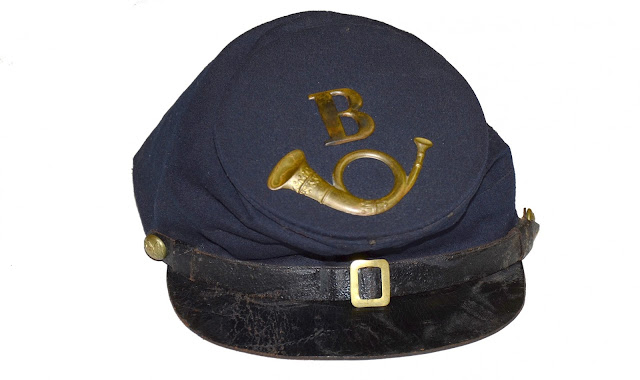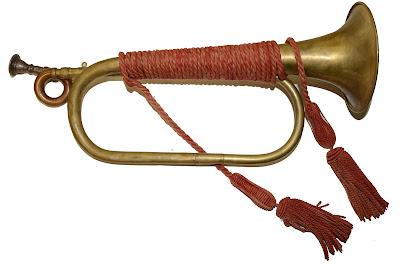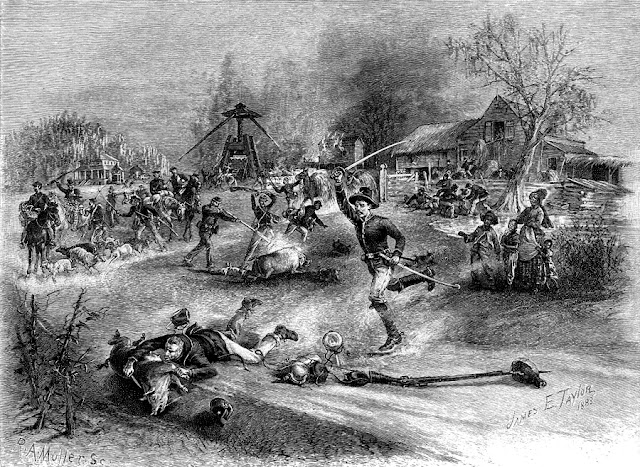On the March in Earnest and Full of Fight: An Illinois Bugler Marches to Murfreesboro
English-born Charles Lewis Francis marched towards
Murfreesboro as a bugler serving in Company B of the 88th Illinois
Volunteers under the command of Colonel Francis T. Sherman. His account of the
Stones River campaign is remarkable for not only its candor but its attention
to detail and is one of my favorite accounts describing the opening days of the
campaign. This excerpt is drawn from Francis’ book entitled Narrative of a Private
Soldier in the Volunteer Army of the United States During a Period Covered by
the Great War of the Rebellion of 1861 which was published in 1879.
On Christmas
morning we had received our orders and were ready. We had all written to our
friends in the North, many for the last time, and exchanged our fine Sibley
tents for the new shelter tents. The $2 per man that the general government allowed
as an enlistment premium and which had been retained by our company patron (the
Chicago Board of Trade) and by him expended had come back to us in the shape of
an excellent rubber blanket apiece. On the morning of the great Christian
festival, we broke camp and made an advance of about a mile where we
established a strong outpost and went no further. It was said that General
Rosecrans was not ready. He was a good churchman and did not believe in
fighting on Sunday nor in undertaking a movement on a holy day. This was the
talk amongst the soldiers and I only give it as such.
The next day,
however, we were on the march in earnest and full of fight. We were much
lighter baggage than we had previously been and we met the enemy before we were
an hour from camp. Sheridan’s division to which my regiment (88th
Illinois) belonged went through Nolensville with a rush. I had just time to notice
that Nolensville consisted of about half a dozen miserable shanties; the most
pretending seemed as if it might have been a schoolhouse but the same sign over
the door with the legend ‘Tippling House’ upon it dispelled such illusions.
The road thence led up a strong
and steep hill and as it got on toward the top it was wooded on either side. In
the woods and half a mile ahead of us, an Ohio regiment had a lively fight in
the afternoon (see "Charles Barney Dennis at Stones River part 1" here) and succeeding in
driving the enemy besides capturing two English rifled cannons, a few horses, and
several prisoners. The enthusiasm of the army was well-nigh unbounded at this
success so near the outset, and although we were formed into line of battle not
far to the rear, we were envious of the regiment that had the honor of being in
front of us.
That night we laid on our arms
in an open field on the left of the road and near the foot of the rising ground
but protected in a measure by some heavy woods near us. The light drizzling
rain that had been falling all the afternoon had increased to a torrent, but
the excitement engendered by our proximity to the enemy served well to keep up
our spirits. Besides this, our new arrangements for camping were admirable. Two
men slept together. One rubber sheet on the ground and a woolen blanket on
that, then another woolen blanket on top with the shelter tent and rubber on
the outside. In this manner two men were effectually protected.
On the next two days, we
skirmished with the enemy continually and our regiment came in for a good share
of the hard work. Our company being on one of the extremes of the line, it was
usually deployed when skirmishing duty was demanded and so I had plenty of
opportunity for using my bugle. The road we were on had a macadamized bed and
would have been a good one to travel upon had it not been for the excessively
wet weather; as it was, the surface in level places was nearly ankle deep in
liquid limestone.
On Saturday night it was
reported that the enemy had changed front and formed his new lines in another
direction between Stones River and the town of Murfreesboro. It had been
raining all day and the night promised to be only murkier and gloomier than the
wearisome day had been and when we ascended the hill on the right of the road,
the men felt in any but elevated spirits. Just as we had received orders to
stack arms in the place selected for our bivouac, the sky cleared just above
the western horizon and for the space of about half a minute the sun appeared
in indescribably great glory then vanished. This was instantly taken as a good
omen and the drooping spirits of the soldiers rose at once and the army gave a
tremendous shout that rent the air; the noise of that cry from tens of
thousands of throats far exceeded the uproar of the great battle fought a few
days after and, as the shouting was echoing from the clouds as it were, the
incident was awe-inspiring. This lasted, however, for only such a little while
and we sank upon the wet grass to rest our weary limbs and to eat what was left
of our three days’ rations.
The next morning (Sunday
December 28th) was clear and cold and we heard with dismay that the
enemy’s cavalry under Wheeler had intercepted and cut off our supply trains
from Nashville. It was again given out that General Rosecrans would not follow
the new direction on Sunday and we were to have rest. But rest without rations
was not so good a thing. Early in the morning, an order was received by each
company commander to send six men on a foraging expedition for his company:
this was the first legalized gobbling that I had seen. In a wondrously short
time after the order was received it was executed and more than executed with
spirit and alacrity. Instead of detailing six men out of each company, most of
the company left just that number behind and no more, the rest going out as
foragers.
Foraging is the name when
legalized and gobbling when not. Of this particular expedition, I can only
describe the part taken by the squad I happened to be with. We went through the
woods, over hills, across bottoms, through fields, and over rivulets for a mile
or more to our right and front without meeting any prospects of success. Then
the incorrigible Tommy Corrigan who was some distance in the advance made a
loud exclamation that told us he was not far from a prize and we saw at a
distance of half a mile a large substantial mansion and numerous outbuildings.
We hastened our steps and after clearing numerous ditches and fences, we
entered a long lane in which we formed into line with Tommy Corrigan on the
right as undisputed commander.
We soon reached the place and as
an institution found it to be greater than many of the towns we had passed
through, although the latter generally boasted high-sounding names. The mansion
itself was a large two-story wood building and had the inevitable hall running
through the center of it and immense chimneys built on the outside of each end.
The second story was almost an exact company of the first. A sort of porch ran
up to the roof and the door leading into it from the second story was exactly
like the front door below, even to the knocker. There were numerous outhouses,
granaries, smokehouses, stables, root-houses, and henneries on one side of the
main structure and on the other a village of Negro huts lying low and irregular
like so many smashed tiles.
Before we got to the lawn
entrance, we met a Negro man who was nearly scared to death and he came toward
our position fairly dancing with fear. From him we learned that his master was
a Rebel of the deepest dye and only the night before he had captured a Union
soldier and had conveyed him to Murfreesboro where the poor fellow was to be
shot for being a spy. The master was “cruel to his slaves” as well as he had
shot or hung several of the Negroes who had attempted to get away.
We now held a council of war and
having informed ourselves of the nature of the surroundings as to the number of
the inmates, locality of the provision stores, etc., we advanced towards the
house. When we entered the gate, we saw a fat, jolly looking old planter
standing in the doorway of the house. He was perhaps 60 years of age and
appeared as if during the whole of that period he had lived upon the best that
the land afforded. But he had a gun in his hand and as Tommy Corrigan drew a
musket to his shoulder, he gave the command ‘drop that piece’ and the piece was
dropped as if it was red hot. Then we advanced and seized the old gentleman. He
was very belligerent- in fact, full of opposition- but we soon disarmed him and
set a guard over him some distance away from the house.
On ransacking the place, we
found the planter’s wife and two daughters. They boastingly told us that the
husbands of both of them were in the Southern army and would revenge any injury
we might do. We tried in vain to make them understand our situation as we were
only after forage and intended no harm to them personally. We could do nothing
else other than order them out and place them under guard with the husband and
father. On closer inspection we discovered the uncleansed dishes in the kitchen
amounted to more than would ordinarily accrue from a meal of four persons and
this led to an examination of the old man. He boasted of his capturing the
Union spy and threatened that belong long the Confederates who had breakfasted
with him that morning would return. If the old man told the truth in his
violence, he was the most brutal enemy I had yet met. He confessed to almost
every offense a war Rebel could be charged with.
The old man was given ten minutes to secure what he wanted out of the house. This he refused to accept; neither would the women secure anything. They were then bound, the Negroes ordered to the rear, and the plethoric meat house was plundered. When we returned, the provost guard took charge of our prisoners. We made the Negroes beasts of burden and they carried our plunder of corned hams, bacon, sausage, meat, potatoes, apples, etc. For hours on that afternoon and evening, we were engaged in frying our meat and cooking the rest of our confiscated rations.
Source:
Francis, Charles Lewis. Narrative of a Private Soldier in
the Volunteer Army of the United States During a Period Covered by the Great
War of the Rebellion of 1861. Brooklyn: William Jenkins and Company, pgs.
93-100














Comments
Post a Comment